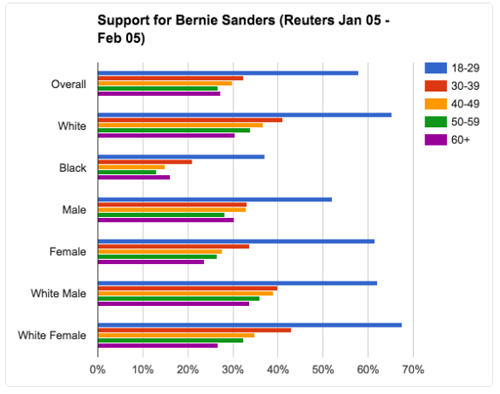So, what the Sanders campaign really is when you get past the idiosyncrasies of Bernie Sanders, is an expression of dissatisfaction with the status quo and a desire to change the party to meet the needs of the country on a more urgent basis. And the practical way that can be done is by having their voices heard at the convention. To the degree that this ambition is shunted, the progressive conscience of the party is marginalized and frustrated.
The focus shouldn’t be so much on personalities or the worst behavior of the loudest and most annoying people. It should be on the big picture. Young people, in particular, are vastly more attracted to the Sanders message than what is being offered by Clinton. These are potentially Democratic Party members for life, but that isn’t going to happen automatically, and especially not if they feel that their beliefs are unacceptable and have been defeated.
The youth, the committed organizers, the fighters who stood up when no one else would, these are not simple Bernie Bros. or chair-throwers or disloyal Johnny-Come-Latelys. If they are lumped all together, insulted, and told that they are not welcome, that’s going to come with a cost for the Democratic Party that the party won’t want to pay.
Clinton will be the nominee of the Democratic Party, and she wants to win. That means that dealing with this division in the party is her problem. She’s got to figure out the best way to bring the party together. If that means being a bigger person, or if that means making an uncomfortable concession, or if that means adopting or even co-opting some of the Sanders agenda, then those are things she’ll have to consider.
What won’t work is pretending that progressives are all primarily concerned with one individual named Bernie Sanders and that this is all about him.
“The youth, the committed organizers, the fighters who stood up when no one else would, these are not simple Bernie Bros. or chair-throwers or disloyal Johnny-Come-Latelys. If they are lumped all together, insulted, and told that they are not welcome, that’s going to come with a cost for the Democratic Party that the party won’t want to pay.” This is something I’ve been saying all along. For the past several years the Democrats have been assuring us that, some day, all the stupid old conservative, bigoted white people will die off and be replaced by younger, more liberal, voters. And then the Dems will be winners!
But now I’m watching the establishment Democrats kiss off a whole generation of voters, telling them to go home and play with their toys and leave politics to the grown ups. Good luck turning those people into Democratic voters in the future, geniuses.
Let’s review:
(Source: “Bernie Sanders Is (Still) the Future of the Democratic Party” by Matt Yglesias.)
I told someone this morning that it’s starting to feel like 1971 again; Sanders supporters are the antiwar movement, and the Democratic Party and its loyalists are the Nixon Administration. What should have been a temporary disagreement is turning into a generation-changing moment that will hurt the Democratic Party for years to come.
Martin Longman suggested also that Clinton herself step up and show some leadership to bring the situation under control:
What I think people should be focused on, and by “people†I mean the folks at the top of the Sanders and Clinton campaigns, is how to mend some fences and get this craziness under control. Precisely because Clinton has this thing wrapped up, she doesn’t need to resort to procedural hardball to squeeze every last delegate out of the process. She needs the votes of Sanders voters in the fall more than she needs a couple more delegates out of Nevada or a disproportionate number of seats on the power committees at the convention.
He had advice for Sanders also; he’s not saying Clinton alone should take action. He wants Sanders to be more forthright in telling his followers to cool it. But then Nancy LeTourneau — and I really like Nancy LeTourneau — argued that it wasn’t fair to expect Hillary Clinton to be magnanimous, because she’s a woman.
So…there is nothing wrong with expecting the winner to be magnanimous. But the truth is, women have been doing that for centuries. We’ve been smiling and taking it because to do otherwise diminishes our ability to reach our goals. When we ask this of Hillary, women all over the country know exactly what that feels like and we risk triggering their ire in response. In this case, what we have is a white male candidate whose supporters claim grievances that are expressed via tantrums and threats. But we place the burden on the woman to reach out and make nice.
Excuse me while I pound my head against a wall for awhile. In the meantime, read Shaun King at the NY Daily News.

